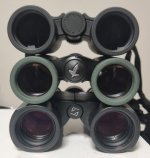So why do you post a picture of three Swarovski, one Kowa and one Zeiss binoculars with your answer? Is there a connection with your text?View attachment 1562761
I have checked. but after you said about it, I wonder If I had mistaken the distance between the center of the two objective lenses.
-
Welcome to BirdForum, the internet's largest birding community with thousands of members from all over the world. The forums are dedicated to wild birds, birding, binoculars and equipment and all that goes with it.
Please register for an account to take part in the discussions in the forum, post your pictures in the gallery and more.
You are using an out of date browser. It may not display this or other websites correctly.
You should upgrade or use an alternative browser.
You should upgrade or use an alternative browser.
Brief comparison between Swarovski AX Visio 10x32 vs EL 10x32 Swarovision (1 Viewer)
- Thread starter jackjack
- Start date
More options
Who Replied?Thanks for sharing your thoughts jackjack. It looks as though there is a price paid (optically as well as financially!) for the "smart" features, but not excessively so. Of course the weight/bulk penalty is pretty high, not to mention the cost factor! It'll be interesting to see how the market takes to the AX concept.
Some other points I thought were particularly interesting:
"eye strain" - interesting that you think 3D and blue light transmission result in a decrease in the "comfort of the view" / cause the binocular to be "more stressful" in use. Would this be something that you find to be individual to yourself, or do other users experience the same? I myself don't really notice 3D in any binoculars (although I use porro prism binoculars quite a lot, both with and without glasses), probably because most of my viewing is at long distance, where 3D is said to be less evident. I do think a warm or slight yellow colour cast can take the edge off very harsh bright sunlight, and would agree a very bright binocular can be fatiguing to use in very bright conditions, but I can't say (from my own experience) that I've found binoculars with a bluer or "cooler" cast are more fatiguing to use because of their colour rendition in itself (eg. when it's less bright). I'd say magnification and ergonomics are more important in managing fatigue than colour rendition; another thing I do think helps with fatigue over long viewing sessions - although not really necessary as I've used non-flat field binoculars for long sessions without complaint - is flat field.
"ease of view" - I think I see what you mean in distinguishing "ease of view" and "comfort of the view". I have to admit though that exit pupil size, in itself, makes a real difference in ease/comfort of view.
coatings of glasses - I had not thought about this before, but a lot of brochures in glasses do indeed specify coatings to reduce blue light transmission, and it's interesting to consider how this interacts with binoculars. I've tried one or two binoculars with glasses and without, albeit not extensively, and would say the main difference seems to be in brightness (no glasses = brighter, unsurprisingly). I'll check for differences in colour rendition next time: from recollection, the differences I've observed in this respect have been fairly modest, but I should do more comparisons to be sure.
Appreciate your thought-provoking posts!
Some other points I thought were particularly interesting:
"eye strain" - interesting that you think 3D and blue light transmission result in a decrease in the "comfort of the view" / cause the binocular to be "more stressful" in use. Would this be something that you find to be individual to yourself, or do other users experience the same? I myself don't really notice 3D in any binoculars (although I use porro prism binoculars quite a lot, both with and without glasses), probably because most of my viewing is at long distance, where 3D is said to be less evident. I do think a warm or slight yellow colour cast can take the edge off very harsh bright sunlight, and would agree a very bright binocular can be fatiguing to use in very bright conditions, but I can't say (from my own experience) that I've found binoculars with a bluer or "cooler" cast are more fatiguing to use because of their colour rendition in itself (eg. when it's less bright). I'd say magnification and ergonomics are more important in managing fatigue than colour rendition; another thing I do think helps with fatigue over long viewing sessions - although not really necessary as I've used non-flat field binoculars for long sessions without complaint - is flat field.
"ease of view" - I think I see what you mean in distinguishing "ease of view" and "comfort of the view". I have to admit though that exit pupil size, in itself, makes a real difference in ease/comfort of view.
coatings of glasses - I had not thought about this before, but a lot of brochures in glasses do indeed specify coatings to reduce blue light transmission, and it's interesting to consider how this interacts with binoculars. I've tried one or two binoculars with glasses and without, albeit not extensively, and would say the main difference seems to be in brightness (no glasses = brighter, unsurprisingly). I'll check for differences in colour rendition next time: from recollection, the differences I've observed in this respect have been fairly modest, but I should do more comparisons to be sure.
Appreciate your thought-provoking posts!
tenex
reality-based
An awkward situation is developing here. Let's just consider stereopsis: of course one measures from the center of the lens, but Schmidt-Pechan designs don't typically produce any effect at all, and no one could possibly notice a couple of millimeters anyway. SLC 56s (Abbe-König) have objectives 12mm further apart than the oculars, which must be about the maximum among roof prism bins, but still that's only 18% of my interpupillary distance and I don't notice an enhanced effect (as much as I love the bins). Of course Porro designs are another story; a Nikon E II doubles my IP, and that I can notice, at modest distances.
So the question for jackjack is: why bring up something that's not evident, even to an expert, in the examples under discussion (AX, EL, SF) as you seem to be claiming? Perhaps you can understand how this generates doubts.
So the question for jackjack is: why bring up something that's not evident, even to an expert, in the examples under discussion (AX, EL, SF) as you seem to be claiming? Perhaps you can understand how this generates doubts.
Last edited by a moderator:
3D effect is manufactured in the brain of the observer, and is therefor neither objective nor measurable.
It seems to me that it is futile to discuss either subjective or unmeasurable aspects at such length, since there is no way to determine or express as a number what anyone else sees, but I guess that’s what keeps this place humming along.
Perhaps, once again, I misunderstand.
It seems to me that it is futile to discuss either subjective or unmeasurable aspects at such length, since there is no way to determine or express as a number what anyone else sees, but I guess that’s what keeps this place humming along.
Perhaps, once again, I misunderstand.
NO. it is not connected to my text.So why do you post a picture of three Swarovski, one Kowa and one Zeiss binoculars with your answer? Is there a connection with your text?
the korean main distributor of Swarovski also distributs kowa. just wanted to compare the sizes because bd2 8x32 is much smaller then EL 32
and I just posted the whole photo I tooked before.
is that bothering you?
Last edited:
I agree roof prisms cannot follow 3D effect of porro prisms. even Abee prism ones.An awkward situation is developing here. Let's just consider stereopsis: of course one measures from the center of the lens, but Schmidt-Pechan designs don't typically produce any effect at all, and no one could possibly notice a couple of millimeters anyway. SLC 56s (Abbé-König) have objectives 12mm further apart than the oculars, which must be about the maximum among roof prism bins, but still that's only 18% of my interpupillary distance and I don't notice an enhanced effect (as much as I love the bins). Of course Porro designs are another story; a Nikon E II doubles my IP, and that I can notice, at modest distances.
So the question for jackjack is: why bring up something that's not evident, even to an expert, in the examples under discussion (AX, EL, SF) as you seem to be claiming? Perhaps you can understand how this generates doubts.
but still, there are some diffrence, though gap is not as big as comparing roof to porros.
below is
UV hd+ 8x32
el 8x32
conquest 8x32.

the distance of the center of the objective lenses is uv < el < conq
but the amount of pincusion distortion is
el < conq < uv



so the rendering of spaces I see (amount of perspective) is el < uv < conq.
el has wider set objs then uv but really lacks pincusion distortion.
uv has more pincushion distortion but cleary lacks the width of the objects then conq.
also I agree that feeling perspective varies among individual eyes.
I heard form my friend that after an eye surgery,his feel of perspective is lot smaller then before. but I can't check because those are not my eyes.
only thing I can check is eye glasses damaging perspectives because I often wear eyeglass to see binos.
maybe my eyes is very 3D sensitive. I have more hard time using porro prisms at close distance then fellow collectors only because of high 3d rendering.
but this is what I saw and I wrote it with the cause that I interfere using theories and experiences.
some one will fell the gap clearer then me and of course, someone can't feel much as I feel.
What is the distance between the centers of your pupils?maybe my eyes is very 3D sensitive. I have more hard time using porro prisms at close distance then fellow collectors only because of high 3d rendering.
but this is what I saw and I wrote it with the cause that I interfere using theories and experiences.
some one will fell the gap clearer then me and of course, someone can't feel much as I feel.
about 65mmWhat is the distance between the centers of your pupils?
dorubird
The unskilled mechanic blames his tools!

From Tobias Mennle review:
"Threedimensionality
of images is astonishingly good. Center-to-center distance is 4mm wider than inthe oculars, less than in the Zeiss HT (6mm) but more than in most other competitors, so the stereo base is wide for roof. Moreover, the not strongly flattened field and the wide field of view probably help perceived 3D."
I also noticed a stronger stereoscopic image with SF 10x42 than with other roof binoculars (I have not tried HT). But of course it doesn't compare to any porro binoculars. However, probably in conjunction with a not strongly flattened field, an improvement of the 3d effect can be observed. But this is a subjective observation because it matters how sensitive each person's eye is to this effect.
"Threedimensionality
of images is astonishingly good. Center-to-center distance is 4mm wider than inthe oculars, less than in the Zeiss HT (6mm) but more than in most other competitors, so the stereo base is wide for roof. Moreover, the not strongly flattened field and the wide field of view probably help perceived 3D."
I also noticed a stronger stereoscopic image with SF 10x42 than with other roof binoculars (I have not tried HT). But of course it doesn't compare to any porro binoculars. However, probably in conjunction with a not strongly flattened field, an improvement of the 3d effect can be observed. But this is a subjective observation because it matters how sensitive each person's eye is to this effect.
Last edited:
Jackjack, sorry to take this a little off the track. You say about the Leica UV-HD+ 8x32, Swaro. EL 8x32, and Zeiss Conq. 8x32 "the distance of the center of the objective lenses is uv < el < conq". May I know, from you, what are the actual measured differences? You/others: In three 8x32 binos such difference is possible only if IPDs are set differently and/or eyepiece and obj. are not coaxial; what is or is likely to be happening here? Thanks.
ht has a bit better 3d rendering. much better then EL 10x42From Tobias Mennle review:
"Threedimensionality
of images is astonishingly good. Center-to-center distance is 4mm wider than inthe oculars, less than in the Zeiss HT (6mm) but more than in most other competitors, so the stereo base is wide for roof. Moreover, the not strongly flattened field and the wide field of view probably help perceived 3D."
I also noticed a stronger stereoscopic image with SF 10x42 than with other roof binoculars (I have not tried HT). But of course it doesn't compare to any porro binoculars. However, probably in conjunction with a not strongly flattened field, an improvement of the 3d effect can be observed. But this is a subjective observation because it matters how sensitive each person's eye is to this effect.

with fully extended,Jackjack, sorry to take this a little off the track. You say about the Leica UV-HD+ 8x32, Swaro. EL 8x32, and Zeiss Conq. 8x32 "the distance of the center of the objective lenses is uv < el < conq". May I know, from you, what are the actual measured differences? You/others: In three 8x32 binos such difference is possible only if IPDs are set differently and/or eyepiece and obj. are not coaxial; what is or is likely to be happening here? Thanks.
UV 75mm
EL 76mm
CONQ77mm
also
67mm
68mm
69mm
at my ipd.
Jackjack, I have the Conquest 10x32 which AFAIK has the same body as the 8x32, and the distance between the centers of the eyepieces and the centers of the objectives are the same. Maybe for you to use the bino comfortably you have to widen the eyecup side to 69 mm although your IPD is (post #28 above) about 65 mm. (If so, I have already, above, asked why, but, to not let this drive the thread off topic, I guess I'd end my dialog here!)
Looks like Tobias can also see differences in three-dimensionality in binoculars whose center to center distances are only a few millimeters apart!From Tobias Mennle review:
"Threedimensionality
of images is astonishingly good. Center-to-center distance is 4mm wider than inthe oculars, less than in the Zeiss HT (6mm) but more than in most other competitors, so the stereo base is wide for roof. Moreover, the not strongly flattened field and the wide field of view probably help perceived 3D."
greatestbinoculars: Zeiss Victory SF 8x42 review
Then again, truth be told... I love Tobias's photos, and enjoy reading his reviews, but can't say I share some of his opinions. Maybe my perceptions just aren't as sophisticated...
tenex
reality-based
"Can also see?" Tobias does cinematography, involving interesting techniques of creating an illusion of three-dimensionality in a flat image taken with a single lens. Here we're talking about perception of actual three-dimensional objects with two eyes, not the same thing at all. The relevant question is how much of a difference in stereopsis is perceptible, and I challenge anyone who claims they can distinguish a couple of extra millimeters (~3% of their IPD) to adopt an actual measure of perceived stereopsis and test it very carefully with otherwise comparable instruments, to avoid confusion due to other effects (DOF, FOV, field curvature, rectilinear distortion...) also alleged to somehow(?) contribute to their nebulous aesthetic impression of "3D" in a binocular, in ways that are purely subjective and may actually result from having seen too many movies.Looks like Tobias can also see differences in three-dimensionality in binoculars whose center to center distances are only a few millimeters apart!
Last edited:
dorubird
The unskilled mechanic blames his tools!

... However, probably in conjunction with a not strongly flattened field, an improvement of the 3d effect can be observed. But this is a subjective observation because it matters how sensitive each person's eye is to this effect.
tenex
reality-based
Repetition doesn't help. And the whole point is that "3D" (apart from stereopsis) is not an objective "effect" (like chromatic aberration) that individuals may be variously "sensitive" to, just subjective impressions and interpretations of poorly explained origin. Of course this applies also to the opposite case, where some (perhaps the same) users complain of an impression of flatness in bins like EL or NL. This isn't some "effect" the eyes of the less "sensitive" fail to perceive; it's not there either, not a property of the binocular, not independently real....However, probably in conjunction with a not strongly flattened field, an improvement of the 3d effect can be observed. But this is a subjective observation because it matters how sensitive each person's eye is to this effect.
dorubird
The unskilled mechanic blames his tools!

You repet exactly I was saying:
I was saying: "it matters how sensitive each person's eye is to this effect"= YOU was saying "Here we're talking about perception of actual three-dimensional objects with two eyes"
And
I was saying: "this is a subjective observation..." = You was saying "is not an objective effect"
We are agre, we say same thing here! 🕊️
What I said is that some people can perceive the stereoscopic illusion more strongly than others depending on the visual sensitivity and the attention given to certain details present or not in a binocular (like the type and amount of geometric distortions, or centers of the objectives slightly further apart than centers of the eyepieces lenses).... Moreover, even the perception of the proximity of objects through all binoculars is still a powerful illusion that we can all observe, and which is obvious to anyone. But stereoscopy in a roof bino is a much more subtle illusion and not all of us perceive it the same amount (it is not something that can be quantified)
A personal example is my experience with Nikon HGL 8x32. These binoculars have the centers of the eyepieces slightly further apart than centers of the objectives, resulting for my perception a flat image compared to other binoculars.
I was saying: "it matters how sensitive each person's eye is to this effect"= YOU was saying "Here we're talking about perception of actual three-dimensional objects with two eyes"
And
I was saying: "this is a subjective observation..." = You was saying "is not an objective effect"
We are agre, we say same thing here! 🕊️
What I said is that some people can perceive the stereoscopic illusion more strongly than others depending on the visual sensitivity and the attention given to certain details present or not in a binocular (like the type and amount of geometric distortions, or centers of the objectives slightly further apart than centers of the eyepieces lenses).... Moreover, even the perception of the proximity of objects through all binoculars is still a powerful illusion that we can all observe, and which is obvious to anyone. But stereoscopy in a roof bino is a much more subtle illusion and not all of us perceive it the same amount (it is not something that can be quantified)
A personal example is my experience with Nikon HGL 8x32. These binoculars have the centers of the eyepieces slightly further apart than centers of the objectives, resulting for my perception a flat image compared to other binoculars.
Last edited:
The impression of 3D Tobias and others see may indeed only be perceived. But then again, in this as in so many other things, perception trumps reality...
...which, at least as far as optics is concerned, is understandable - we all see with our own individual perception.
...which, at least as far as optics is concerned, is understandable - we all see with our own individual perception.
tenex
reality-based
I don't know... everything is relative......we all see with our own individual perception.
No, I don't think we're even using words like "effect" or "sensitivity" the same way, as I pointed out above. I'll try one more time, and if that doesn't work it's not worth continuing. Consider more examples:We are agre, we say same thing here!
* Various well-known optical "illusions" are popular precisely because they're experienced the same way by everyone, since they illustrate something fundamental about human visual processing. For this reason the reaction can be called an "effect", and keeps working the same way every time despite understanding why. There's no individual "subjectivity" or "sensitivity" involved (except in some case of brain injury).
* In contrast, a binocular's magnification is not creating an actual "illusion" of being closer. No one feels tricked, reaches out to touch or recoil from something, or keeps needing to put the bin down to reassure themselves it's really ten times farther away. People just enjoy seeing more detail, which is the purpose of magnification. You can say that it makes you feel closer, but that's romantic fluff, not optical illusion.
* Not everyone experiences colors the same way, notably in the various forms of color-blindness. Again the physiological basis is well known. I suppose individual ability to distinguish colors could be called a matter of "subjectivity" or even "sensitivity", but isn't commonly as that adds nothing.
* Optical aberrations (CA, coma, astigmatism) are common in binoculars and well understood. Everyone is capable of seeing these "effects", and agreeing on which bins have more or less; observers vary only in the degree to which they dislike (and their attention is drawn to) color fringes or smeary edges. This is a matter of individual taste, not visual perception. People commonly say they're "sensitive" to CA, but a term with connotations of perceptive ability isn't the best choice. Taste is sometimes called "subjective", the word being so overused, but really it's a preference not a perception.
Coming back then to the point: all binoculars show three-dimensionality because human vision does. Stereopsis is real, but any claim of enhanced "3D" impression beyond that (or deficit) is more puzzling: evidently "subjective", and not some known "effect" to which individual "sensitivity" would vary. It's not clear what it is at all. If an actual "illusion", it's one that many/most simply don't experience. More likely, it's similar to the feeling of "closeness" that you described, although even those who have it can't specify what cues provoke it or in what proportion. Perhaps it's just an odd way of saying one likes a bin?
Consequently I do believe that you find the HGL view somehow wanting ("flat") but am unsure how that matters to anyone else, and have no idea how you (or jackjack, or anyone) could conclude that 2mm of objective separation would be playing a significant role, as opposed to numerous other factors (DOF, FOV, curvature, distortion etc) which others can also see but many/most don't interpret or describe as you do.
Last edited:
Users who are viewing this thread
Total: 2 (members: 0, guests: 2)





